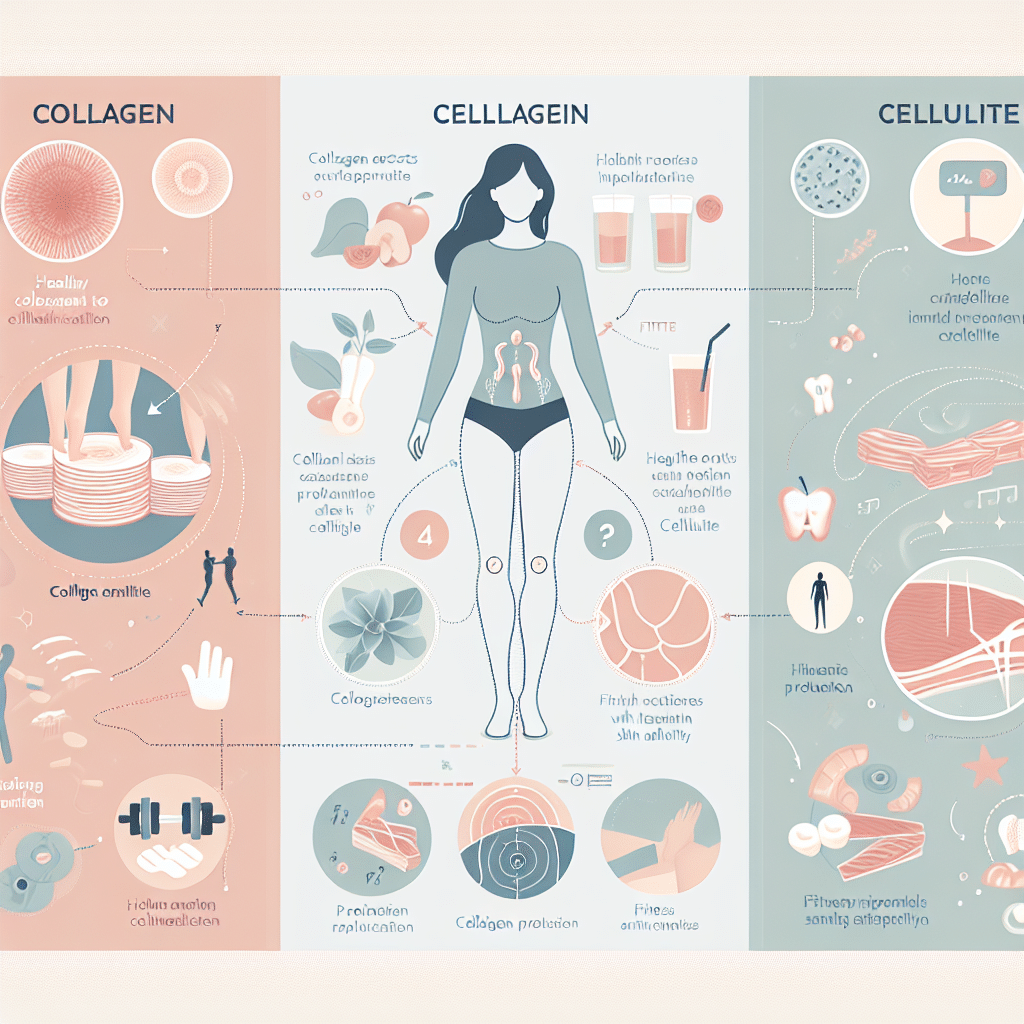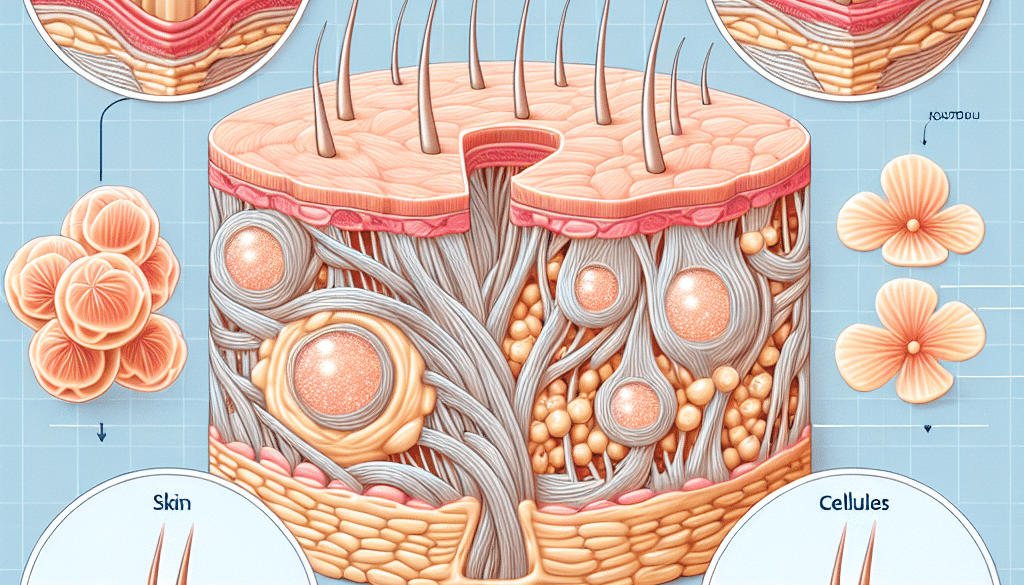Collagen and Cellulite: Smoothing Out the Facts
-
Table of Contents
- Collagen and Cellulite: Unveiling the Truth Behind Skin Smoothness
- Understanding Cellulite and Its Causes
- The Role of Collagen in Skin Health
- Can Collagen Reduce Cellulite?
- Types of Collagen Treatments for Cellulite
- Combining Collagen with Other Cellulite Treatments
- Conclusion: Smoothing Out the Facts
- Discover ETChem’s Premium Protein Products
Collagen and Cellulite: Unveiling the Truth Behind Skin Smoothness

Cellulite, the persistent subcutaneous fat causing dimpling of the skin, primarily in women’s hips and thighs, has been a subject of numerous studies and cosmetic concerns. Collagen, the protein that gives our skin its structure and elasticity, is often touted as a remedy for cellulite. This article delves into the relationship between collagen and cellulite, exploring the scientific facts and debunking myths to provide a clearer understanding of how to achieve smoother skin.
Understanding Cellulite and Its Causes
Before we can examine the role of collagen in treating cellulite, it’s essential to understand what cellulite is and why it occurs. Cellulite is not just ordinary fat; it’s a unique aesthetic condition where fat deposits push through the connective tissue beneath the skin, creating a lumpy or dimpled appearance.
- Hormonal factors: Hormones play a significant role in cellulite development. Estrogen, insulin, noradrenaline, thyroid hormones, and prolactin are part of the cellulite production process.
- Genetics: Certain genes may predispose an individual to cellulite development, including those related to fat distribution, metabolism, and circulatory levels.
- Diet and lifestyle: A diet high in fat, carbohydrates, and salt with insufficient fiber can increase the likelihood of cellulite. Additionally, a sedentary lifestyle can exacerbate the condition.
- Clothing: Tight underwear across the buttocks can limit blood flow and may contribute to the formation of cellulite.
The Role of Collagen in Skin Health
Collagen is a vital protein in our bodies, making up a significant portion of our skin, hair, nails, and connective tissue. It provides structural support and strength, but its production decreases with age, leading to wrinkles and less elastic skin.
- Type I Collagen: The most abundant in the body, providing skin with firmness.
- Type II Collagen: Predominantly found in cartilage, aiding in joint health.
- Type III Collagen: Supports the structure of muscles, organs, and arteries.
Collagen’s role in skin health is crucial, as it helps maintain skin elasticity and firmness. When collagen levels are high, the skin appears smooth and taut. Conversely, when collagen levels decline, the skin loses its elasticity, and cellulite becomes more visible.
Can Collagen Reduce Cellulite?
The million-dollar question is whether collagen supplementation can reduce cellulite. Several studies suggest that collagen may have a positive effect on skin appearance and cellulite reduction.
- A study published in the Journal of Medicinal Food found that women who took collagen peptides daily for six months saw a reduction in skin waviness on their thighs.
- Another study in the Journal of Cosmetic Dermatology reported that a specific collagen peptide supplement improved skin elasticity and reduced cellulite in women with moderate cellulite.
These studies indicate that collagen supplementation could improve the skin’s dermal layer, increasing elasticity and potentially reducing the visibility of cellulite.
Types of Collagen Treatments for Cellulite
There are various ways to increase collagen levels in the body, which may help improve the appearance of cellulite:
- Collagen Supplements: Oral collagen supplements can help boost collagen levels. They are available in various forms, including powders, capsules, and liquids.
- Topical Treatments: Creams and lotions containing collagen are claimed to improve skin texture, though their effectiveness in penetrating the skin deeply enough to affect cellulite is debatable.
- Collagen-Boosting Procedures: Treatments like laser therapy, radiofrequency, and microneedling are designed to stimulate collagen production in the skin.
Combining Collagen with Other Cellulite Treatments
While collagen may play a role in reducing cellulite, it’s often more effective when combined with other treatments and lifestyle changes:
- Regular exercise, particularly strength training, can tighten the muscles under the skin, making cellulite less noticeable.
- A healthy diet rich in antioxidants, omega-3 fatty acids, and vitamins can support skin health and reduce inflammation.
- Staying hydrated helps maintain skin elasticity and can minimize the appearance of cellulite.
- Massage and other mechanical treatments can temporarily reduce the appearance of cellulite by improving lymphatic drainage and stretching the skin tissue.
Conclusion: Smoothing Out the Facts
In conclusion, while collagen may not be a miracle cure for cellulite, there is evidence to suggest that increasing collagen levels can improve skin texture and elasticity, potentially reducing the appearance of cellulite. It’s important to approach cellulite treatment with realistic expectations and to consider combining collagen supplementation with other lifestyle changes for the best results.
Discover ETChem’s Premium Protein Products
If you’re looking to enhance your collagen intake, ETChem’s protein products are an excellent choice. They offer a wide range of high-quality collagen products, including marine, fish, bovine, and chicken collagen. Their products are known for their neutral taste and instant solubility, making them a convenient addition to your diet.
ETChem’s commitment to quality and customer satisfaction makes them a leading supplier in the industry. Whether you’re involved in the nutraceutical, pharmaceutical, or food and beverage sectors, ETChem has the collagen solution to meet your needs.
About ETChem:
ETChem, a reputable Chinese Collagen factory manufacturer and supplier, is renowned for producing, stocking, exporting, and delivering the highest quality collagens. They include marine collagen, fish collagen, bovine collagen, chicken collagen, type I collagen, type II collagen and type III collagen etc. Their offerings, characterized by a neutral taste, instant solubility attributes, cater to a diverse range of industries. They serve nutraceutical, pharmaceutical, cosmeceutical, veterinary, as well as food and beverage finished product distributors, traders, and manufacturers across Europe, USA, Canada, Australia, Thailand, Japan, Korea, Brazil, and Chile, among others.
ETChem specialization includes exporting and delivering tailor-made collagen powder and finished collagen nutritional supplements. Their extensive product range covers sectors like Food and Beverage, Sports Nutrition, Weight Management, Dietary Supplements, Health and Wellness Products, ensuring comprehensive solutions to meet all your protein needs.
As a trusted company by leading global food and beverage brands and Fortune 500 companies, ETChem reinforces China’s reputation in the global arena. For more information or to sample their products, please contact them and email karen(at)et-chem.com today.

